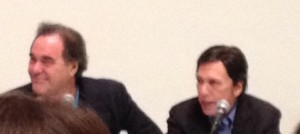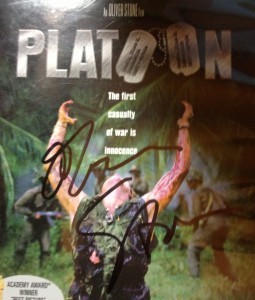Dir. Oliver Stone, ~59 min., free screening at Illinois Institute of Technology
Based on the book of the same name by Oliver Stone and Peter Kuznick, this series is a revisionist history of pivotal American historical events in the same vein as Zinn’s A People’s History of the United States and Loewen’s Lies my Teacher Told Me. The episode screened at IIT concerned the United States’ development and use of nuclear weapons against imperial Japan at the tail end of World War II.
Stylistically, the film barely stops to take a breath. The tapestry of period footage (including battlefield footage) and newsreel films (including both implicit and explicit propaganda) paired with Stone’s rhythmic narration give the film a perpetual motion. The narration pauses only briefly for Stone’s own selection of culled scenes from period films, which (often humorously) comment on period culture and provide a respite from the dense, fact-filled narration. Those clips are a much needed break and feel like a look inside the director’s private film vault. Unlike the sometimes stuffy and static style of Frontline or documentary films that overuse the Ken Burn’s effect on still shots, this film represents the history of World War II as fluid and intertwining streams of historical reporting and pop culture; as Stone said in the Q and A following the film, he applied “his style” to the project.

From what I could gather at the Q and A, Kuznick brought the historical research and he and Stone revised the book and film as they went (similar to Kubrick and Clarke). The overarching goal of the series is to question the dominant narrative of American exceptionalism, reexamining history from a global perspective and turning the critical lens on our treatment of fellow humans. Chapter 3 was certainly successful at that, bringing to light evidence that calls into question the true motives of the United States for using nuclear weapons in wartime (a show of force to deter Soviet expansion rather than a peace-bringing strike to force an unconditional Japanese surrender).
For as much as you might call this film a documentary, however, it presents a distinct viewpoint which it overtly advocates; it’s more of a historical essay than a documentary. Stone remarked that he hoped people would recognize the points where the authors are expressing opinions, and indirectly stated that their prerogative as filmmakers allowed for such insertions: as he said at the Q and A, “We can do it because it’s our film.”
At one point during the film, Stone unabashedly cuts to a review of the HBO film Truman, stating that portrayals of Truman’s aides were “wrong” and that Truman himself was depicted inaccurately in the biopic. I personally found the film to be refreshing in that the agenda was displayed quite prominently. Other so called documentary films I have seen in the past have tried to hide the filmmaker’s agenda behind the deceptive screen of objectivity or a “balanced” perspective. This film lays it all out, though it was troubling to me that Stone referred to the film as a documentary.
I purchased the companion book and I will comment more after I have read it. On a related note, Oliver Stone and Peter Kuznick were quite affable and Stone even signed my DVD copy of Platoon which I have shown to many students over the years. This was by far the best organized and most enjoyable speaker series event at IIT that I have attended.
